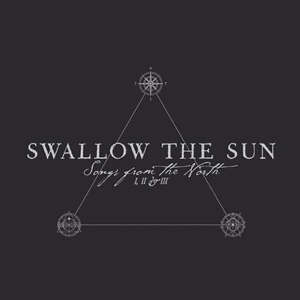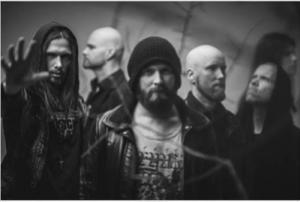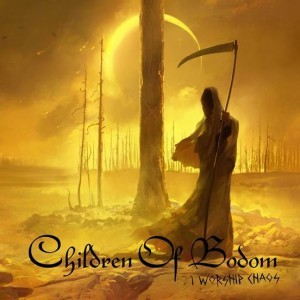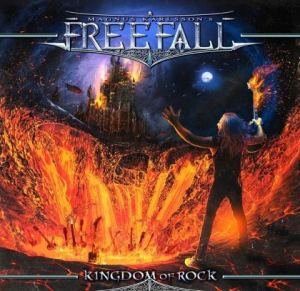With life settling into a strange and slower routine, I’ve had time to listen to stuff that came out in March and early April that I didn’t quite get around to right away with all the craziness happening a few weeks ago. It’s been a nice distraction, but also genuinely exciting in its own right because there’s new music from some big names covered down below, well —- big names in my book anyway. That includes blog favorites Aeternam, as well as the return of the mighty Roy Khan in Conception! Keeping these relatively short because I have a monster Nightwish review coming soon next in my more typical lengthier approach, and there ended up being quite the handful of releases in this update. Let me know what you think in the comments section below, what new or old music have you all been checking out lately?
Aeternam – Al Qassam:

I have been excited about a new Aeternam album ever since I saw them in Austin on their opening slot supporting Orphaned Land and Tyr on their 2018 North American tour, having been made a fan of theirs shortly before with the 2017 release of Ruin of Empires. They of course made that year’s best albums list, and we’ve promoted them fairly heavily on MSRcast in the past few years so I’d imagine most of you know about them already so I’ll spare the bio. Aeternam have their own approach to the arguably unfortunate but seemingly accepted genre tag of oriental metal. Their largely melodeath with hints of thrash approach is tempered with ample doses of Middle Eastern melodicism that is often delivered via lead guitar motifs rather than the largely string driven approach of their peers in Orphaned Land. That means that Aeternam’s sound is denser, thicker, and brutal in passages even though it’s still capable of being richly melodic even during more furious moments. You hear this contrast straight away on “The Bringer of Rain”, a song that’s equal parts rage filled aggression and epic, soaring, melodic majesty. On “Ascension”, vocalist/guitarist Achraf Loudiy slams straight into a vicious riff and guttural roar from the three second mark, taking us for a ride that spans fierce, pummeling riffs backed by martial percussion and tribal drumming by Antoine Guertin. It’s easily the heaviest moment on the album, maybe the band’s heaviest moment since Moongod’s “Hubal, Profaner of Light”, yet still is structured around a twisting, sharp angled melodic through line. This is largely a far heavier album than Ruins of Empires which albeit suitably headbanging in its own right, was more of an exploration of the band’s cinematic side. On Al Qassam, it feels like the band are taking what they learned there, and marrying it to the straight ahead thunder of their 2012 classic Moongod, the fusion producing an album that’s both true to their sound and daringly experimental.
The latter side comes through in most of the songs here, even if they’re meant as breaks of sunlight amidst an otherwise darkened, metallic storm. Case in point is “Hanan Pacha”, a remarkably epic track built on throat-ripping vocal aggression from Loudiy and awesome riff interplay with his new lead guitarist Maxime Legault (who was in the band when I saw them live but is making his first recording appearance with them on this album). But this assault ceases towards the middle bridge of the song, with Loudiy clean singing over gorgeous acoustic guitars, inspired melodic flourishes from Legault and an epic string backdrop, all before swooping back down into a tunnel of pure brutality to close it out. Speaking of Loudiy’s clean vocals, he’s simply never sounded better at it than on this album, particularly on the should-be-a-single “Lunar Ceremony”, which starts out with an impassioned performance by him that is boldly upfront in the mix. This confidence in his abilities might be what prompted him to try singing this track entirely in cleans, a first for the band on a heavy song, demonstrating that they can mold and shape their sound in varying degrees. Despite the lack of guttural vocals here though, Aeternam avoid sounding in any way like their contemporaries in Myrath (not that it’d be a bad thing persay, I love Myrath), because of course, its all about the minor key laden riffing here, and that doesn’t fade into the background just because clean vocals are in the mix. On the most mellow cut on the album, “Palmyra Scriptures”, Loudiy is joined by Orphaned Land’s own Kobi Farhi who lays down a characteristically beautiful vocal performance in English, a striking counterpoint to Loudiy’s own Arabic language vocals. And I was really impressed by the creativity and breadth of songwriting shown in “Celestial Plains”, as varied and expansive a song as I’ve heard Aeternam ever cook up, built on grandiose orchestral cinematics, major chord clean vocal harmonies, all while still structured around a dramatic series of riff progressions. This is an excellent album by a band that seemingly doesn’t know how to make a bad one. They know their sound, they clearly love the style of music they’re creating, and so do I.
Heaven Shall Burn – Of Truth And Sacrifice:

I know that anything that resembles metalcore has tended to elude coverage on this blog, and that’s largely because I just think most of the genre is derivative to the point of exhaustion. But I have had some quiet appreciation for the style’s founders, as seen in my opening up about enjoying Hatebreed a couple years ago when their last album came out. I’ve felt the same way about Germany’s Heaven Shall Burn, having found myself impressed with footage of their sets at various Europoean metal fests, and enjoying a couple of their earlier records in small doses when the mood struck. I haven’t listened to a new Heaven Shall Burn record in ages, but this one landed in my Spotify recommends and honestly, I’ve been coming back to it again and again. I’ve likely missed a transition point somewhere, but I don’t remember this band being as heavily melo-death steeped as they sound on this new album. Amidst the pure andrenaline fueled fury in tracks like “Thoughts and Prayers” and “Eradicate”, there’s a surprising nod to Scandinavia in the syrupy melodies found in “My Heart and the Ocean”, and “Children of a Lesser God”. In the midst of the latter, the band slow things down to an Insomnium-styled moody, textural, introspective passage. Its followed up by a Fear Factory-hearkening industrial tinged assault in “La Resistance”, both songs featuring unexpected twists, a recurring theme through the album. Others will know the context better than I, but the band is experimenting here in a surprisingly expansive and unabashed manner. That they’ve gone for the double disc length approach with nearly 100 minutes of music on offer is a risky play, but I’ve found that my attention span hasn’t waned throughout it and that when its over I’m perfectly fine with hitting repeat and letting it fly again. This might be a surprise recommendation, but I think everyone should give this one a chance no matter their stance on metalcore.
Lucifer – Lucifer III:

I’ve kept a curious eye on Lucifer for the past few years, not only for the presence of the man behind Entombed’s Left Hand Path in Nicke Andersson, but for the earthy yet ethereal vocals of frontwoman Johanna Sadonis. I got into them after becoming a fan of the now defunct 60’s hard rock revivalists Purson, at that band’s one Houston gig actually in 2016 from the advice of a fellow attendee there. Lucifer had released their debut the year before, and it was intriguing enough, not quite as gripping as Purson, but I thought their throwback, occulty hard rock had potential. Fast forward to now and their helpfully titled third album, and I think they’ve finally realized a fully fleshed out version of what it is they’ve been trying to do. The improvements are subtle, but I hear growth in the intelligence of the songwriting, such as on the complex yet straightforwardly catchy “Midnight Phantom”. Sadonis and Andersson have gotten better at building up to the delivery of their memorable hooks, particularly with slowly escalating verse-bridge transitions, complemented by wonderfully dirty, buzzy riffs from Martin Nordin. Its at once heavier than anything they’ve done, yet still hits the same satisfying pop notes that they brought to the table with “California Sun” from their last record. We even get some metallic-doom level aggression on “Coffin Fever”, the extra heaviness being spread across these nine songs. Sometimes they run into the same problem that handicapped their first two albums, the meandering, lack of a payoff that characterizes a song like “Leather Demon”, but its not enough to sink what is easily their best album to date.
Myrkur – Folkesange:

Some of you might remember that I was so enthralled by Myrkur’s sophomore album Mareridt, it wound up making the top five in my 2017 Best Albums list. I wrote in that review that it succeeded in employing a more creative and natural folding in of the black metal elements than her debut album. But what really drew me back to it over and over was that she greatly expanded the depth and variety of the rustic, darkened folk music that was woven throughout the album. She’d introduced it on her debut of course, but it was kept separate from the black metal tracks, little interlude esque slices of respite amidst the Ulver-ian fury. That she found a way to integrate both elements was really exciting, and I still think its one of the best folk-metal albums in recent memory, vicious and entrancing in one package. Its kind of a surprise then that she’s chose to sharply veer away from that merging of her two musical worlds on its follow up, the appropriately titled Folkesange. This is a purely Scandinavian folk music album, with a lot of it’s gorgeous instrumentation played by Myrkur (Amalie Bruun) herself —- piano, violin, mandolas, lyres, and something called a nyckelharpa (sort of a Swedish hurdy-gurdy apparently). She layers these instruments together on tracks that are a mix of reworked old folk songs and some originals written in a traditional style. The only one I know for sure that Bruun crafted herself is the leadoff track and first single “Ella”, a richly evocative piece of music that throbs and pulses with a quality of ache and yearning I’ve come to associate with the music of Loreena McKennitt. I’ve got a suspicion that she’s also personally responsible for the excellent “Leaves of Yggdrasil”, which moves at a haunting, almost stately pace, Bruun’s truly spectacular vocal both ethereal and earthy. She’s brought in Heilung’s Christopher Juul to helm the production on this album, and he clearly understands these instruments and how to record them in such a way as to preserve their room filling texture. And it all largely works really well, I’ve enjoyed having this on lately, particular when I needed to chill out. I found the inclusion of her take on Joan Baez’s rendition of the Scottish ballad “House Carpenter” a weird, distracting choice however (it’s not bad, but it doesn’t really fit either), but its a minor quibble. This is, admittedly, a strange album to review in the regular sense, because there’s nothing metallic about it at all, so I kinda don’t know what to tell you there. Either you’ll be into this or it’s just not your cup of tea, I can only say it’s worth the time to find out.
Dynazty – The Dark Delight:

I don’t think I’ve ever written about Dynazty before, a band I came to know only due to vocalist Nils Molin’s prominent role as Jake Lundberg’s replacement in Amaranthe. In that role, Molin does a solid job, but in between their screamer Henrik Englund and of course Elize Ryd’s roles in the vocal department, we don’t get to hear much of Molin’s range, with his spots frequently coming in the form of vocal counterpoint to his fellow singers instead of a lead vocal role. In Dynazty however, Molin reveals himself to be an excellent, versatile singer, possessing a smooth tenor, a voice that sounds at home alongside hard rock and more power metal inclined fare. I was impressed with him on 2018’s Firesign, and perhaps even more impressed with his performances here on The Dark Delight (not in love with that title… sounds like a brand of dark chocolate but oh well). But Molin isn’t and shouldn’t the only focus here, because Dynazty is a pretty good band in their own right, with guitarists Rob Love Magnusson and Mike Lavér capable of seamlessly blending melodeath groove riffery with a looser hard rock inspired feel. This combination results in a sound that is capable of being thicker and darker along the lines of Kamelot or recent Pyramaze, but Molin can lift things into more soaring, shimmering, AOR territory with his vocal melody writing chops that remind me of, well, Jake Lundberg. Lead single “Waterfall” is a perfect example of this, a song that starts out in groove-riff territory but bursts skyward with the sudden onset of Molin’s strong chorus, all without the benefit of a transition bridge (that this works is a rarity in my experience). I’m absolutely loving the heartstring plucking power ballad “Hologram”, not only for its unusual lyrical bent that eschews sentimentality for a more abstract emotional perspective, but for Molin’s impeccable chorus, built on an interplay of a massive major key vocal hook and punctuating symphonic grandeur. Elsewhere on “Heartless Madness”, we hear that hard rockin’ sound that was so prominent on Firesign that seems to have been pushed a little bit to the backburner this time around. That’s okay though, because even in delivering a darker, more metallic album this time around, Dynazty still retains that AOR hard rock DNA in their songwriting, and damn, do I need that right now. This is a quality album, don’t miss it.
Dark Forest – Oak, Ash, & Thorn:

I’m a recent convert to England’s Dark Forest, having been introduced to the band as recently as late December with their 2016 opus Beyond The Veil, one of the most unusual and refreshing power metal albums I’ve heard in awhile. They have a unique sound, at once a mix of a rootsier, more rugged Falconer with splashes of Skyclad and a vocalist who reminds me of the versatile Bruce Dickinson we heard on his many solo albums. That vocalist, one Josh Winnard, is on his third album with the band, having joined the band in 2012 replacing former singer Will Lowry-Scott who was only on board for an EP and the band’s sophomore album (before him, founding guitarist Christian Horton handled vocal duties for their demos and s/t debut album). I haven’t gone back to see how Lowry-Scott nor Horton measured up at the vocal helm, but really I can’t imagine this band’s songs without Winnard’s rather distinctive vocals in the mix —- to me he’s that integral a part of their overall sound. Strike another similarity to Maiden and Dickinson in that regard. I think its fair to say that I haven’t been this intrigued and enthralled by a British metal band since Dragonforce. Their sound is difficult to pinpoint, but Oak, Ash, & Thorn provides examples aplenty, as on the surging, gloriously melodic “Relics”, a whimsy-folk infused song with Maiden-esque guitar patterns and an elating quality to its melodies. There’s an almost Elvenking-like playfulness to the lead off single “The Midnight Folk”, not only in its effervescent lead guitar motifs, but in Winnard’s almost punk-tinged approach to the vocals during the chorus. There’s always a slightly rough, jagged edge to his singing, and it really shows up here in a charming way (particularly in the “whoas” sailing in from the background) that reminds me of Damna’s approach. The martial percussion and machine gun riffing sequence that sits in the middle of the instrumental “Heart of the Rose” is another moment that exemplifies what Dark Forest can pull off so well, highlighted in those paintbrush strokes of bright, chiming guitar figures that adorn the rhythm track. Dark Forest aren’t polished. That ruggedness, that textural “roughness” you hear is a quality that’s at once purposeful and unavoidable. Its no wonder they’re signed to Cruz Del Sur Music, who gravitate towards non-traditional traditional artists in this vein. I enjoyed this record quite a bit, but not nearly as much as I did Beyond The Veil —- let that be your introduction to Dark Forest, and then come back to this.
Conception – State of Deception:

Well here we are, talking about one of the more surreal things to come across The Metal Pigeon inbox in recent memory in one of the strangest times we’re all collectively living through. I’m speaking of course of a new full length album featuring the one and only Roy Khan, who is back with Conception for their first album since their 1997 (at the time) swan song Flow. You’ll remember that I reviewed their single two years ago, my impression being largely favorable, though admittedly I was simply a little overjoyed to hear Roy singing again. Finally we have the first full length album with Roy on vocals since his Kamelot finale in 2010’s Poetry For The Poisoned, and while its a relief that he’s back in as tangible a way as this, your enjoyment of this album might depend a little on whether you are more of a Roy fan or a Kamelot fan, or of course, a Conception fan. I say that because with the exception of a couple songs/moments that I’ll get to below, this is first and foremost a Conception album. That means a lot of groove based, rhythm-forward, prog-metallic elements in the songwriting, as opposed to the symphonic accompanied stylings we were so used to hearing Roy sing alongside with in Kamelot. The first thing that leaps out when I think about State of Deception is that its decidedly a grower, a record that’s gonna take more than a couple listens to really gel for most of us I’d bet. There’s nothing as immediately hooky as “Flow”, “Reach Out”, or “Angel (Come Walk With Me)” from its predecessor, but Roy and his co-songwriter/guitarist Tore Østby deliver a couple gems here whose addictive qualities are a little more layered. The first among them is the lead off single “Waywardly Broken”, which rides on a classic Conception rhythmic riff progression and rumbling, pulsing bass line, and some tension building keyboard layering. Khan’s inimitable expressiveness is on full display here, and he sounds brighter, sharper here than he did on anything on the Dark Symphony EP two years ago (with the exception of “Feather Moves”, which weirdly seems to be lifted from the aforementioned 2018 single entirely, not even re-recorded, though it’s listed as remastered).
We hear some classic Roy vocal ingenuity in “She Dragoon”, boasting the heaviest attack on the album, and Khan ushering things along like the master vocal melody writer he is, this time using an alliterative twist on some of his lyrics that’s a technique I usually associate with pop acts like Lady Gaga and Chvrches (that’s not a negative comparison in my mind, it’s just something new out of the playbook for Roy). There’s a transcendent moment here, at the 3:49 mark where gorgeous backing vocals deliver an earworm of a hook, while Roy accent sings over the top. Its propulsive and exciting, the kind of thing that made me sit up and take notice the first time around. And I really love “The Mansion”, a slow grower of a ballad that might be the most Kamelot-sounding thing here, complete with a guest vocal drop in by Elize Ryd. That chorus is classic Roy though, all uplift and ethereality, with the keyboard orchestration sweeping us along in a rapturous accompaniment. The lyrics here are a nice reminder of the kind of skills Roy has in this department, with creative imagery and inspired storytelling. Of course, here he’s not dealing with the typical Kamelot-ian epic concepts that some of us might really crave (raises hand), but Conception was never about that kind of thing anyway. I wasn’t as wild about the second single “By The Blues” however, and not for a lack of trying either —- but so many listens on, I just can’t shake the association I’m getting here with Dedicated To Chaos era Queensryche (or more accurately, Tateryche). The lyrical choices might have a lot to do with that, because some of the diction here just seems a little out of Roy’s wheelhouse. Maybe that’s just the lyric snob in me resurfacing again though. It should be said that there’s really only seven new songs on offer here discounting the repeat track and the minute long intro track —- it has me wondering if the band wasn’t thinking of the EP and this album as one long project completed over spans of time that had to be broken up into pieces due to crowdfunding reasons. It does leave me with a sense of slight dissatisfaction however with State of Deception on the whole, because it’s a quality Conception record, but it could have been much stronger.

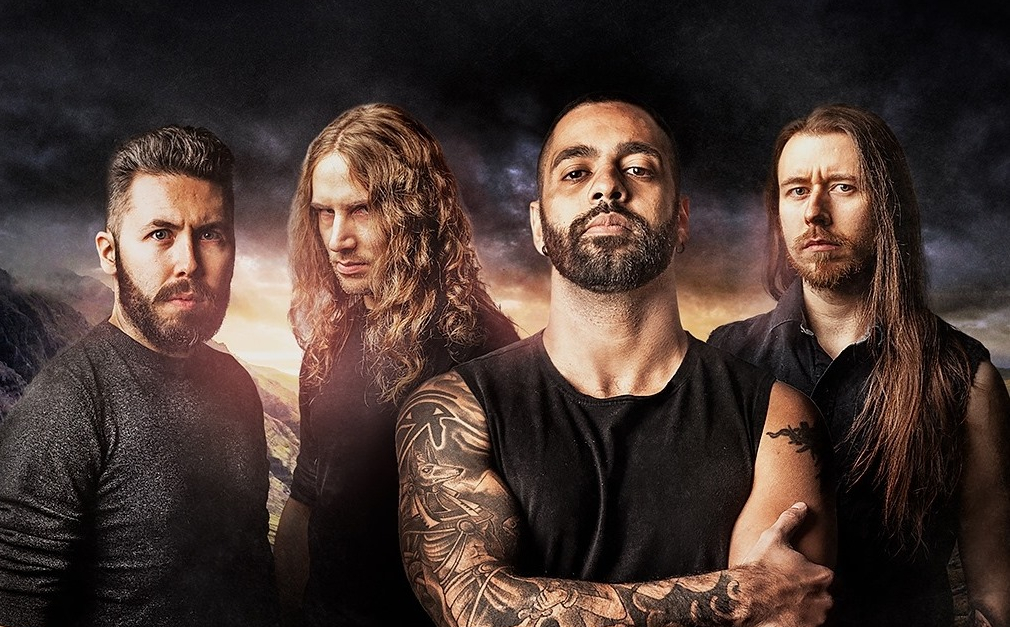

 The background concept is also intriguing, giving reason to explore the lyrics —- Bruun kept a journal about her experiences with sleep paralysis and nightmares recently and a lot of these songs explore the feelings those stirred in her. I’ve experienced sleep paralysis myself, its wasn’t pleasant to say the least (absolutely terrifying when I didn’t even realize what it was at first), so my interest in Mareridt (Danish for “nightmare”) has only deepened on a lyrical level. I think I went into this expecting to like it, but not love it, that perhaps Bruun would make the mistake of trying what Deafheaven did, to get purposefully aggressive in order to win over some of the metal set. That she did the opposite is not only shrewd, but refreshing. She has nothing to prove to anyone, and a lot of the criticism towards her has been transparently misogynistic. I don’t like to use that term blithely, but it seems to me that most of the agitation surrounding her has been largely misguided as a result of the media coverage she gets. Its not her fault that the NY Post’s article about this album has the stupidly ignorant sub
The background concept is also intriguing, giving reason to explore the lyrics —- Bruun kept a journal about her experiences with sleep paralysis and nightmares recently and a lot of these songs explore the feelings those stirred in her. I’ve experienced sleep paralysis myself, its wasn’t pleasant to say the least (absolutely terrifying when I didn’t even realize what it was at first), so my interest in Mareridt (Danish for “nightmare”) has only deepened on a lyrical level. I think I went into this expecting to like it, but not love it, that perhaps Bruun would make the mistake of trying what Deafheaven did, to get purposefully aggressive in order to win over some of the metal set. That she did the opposite is not only shrewd, but refreshing. She has nothing to prove to anyone, and a lot of the criticism towards her has been transparently misogynistic. I don’t like to use that term blithely, but it seems to me that most of the agitation surrounding her has been largely misguided as a result of the media coverage she gets. Its not her fault that the NY Post’s article about this album has the stupidly ignorant sub 